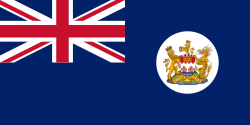| Hong Kong at the 1976 Summer Olympics | |
|---|---|
 | |
| IOC code | HKG |
| NOC | Sports Federation and Olympic Committee of Hong Kong |
| in Montreal | |
| Competitors | 25 in 6 sports |
| Flag bearer | none |
| Medals |
|
| Summer Olympics appearances (overview) | |
Hong Kong competed at the 1976 Summer Olympics in Montreal, Quebec, Canada. 25 competitors, 23 men and 2 women, took part in 27 events in 6 sports. [1]